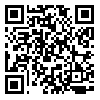Volume 7, Issue 6 (3-2015)
IJMEHM 2015, 7(6): 69-78 |
Back to browse issues page
Download citation:
BibTeX | RIS | EndNote | Medlars | ProCite | Reference Manager | RefWorks
Send citation to:



BibTeX | RIS | EndNote | Medlars | ProCite | Reference Manager | RefWorks
Send citation to:
Imanifar N, Vagharseyyedin S A. Protective nursing advocacy: an evaluation of the beliefs and actions of nurses in educational hospitals affiliated to Birjand University of Medical Sciences during 2014. IJMEHM 2015; 7 (6) :69-78
URL: http://ijme.tums.ac.ir/article-1-5501-en.html
URL: http://ijme.tums.ac.ir/article-1-5501-en.html
1- East Nursing and Midwifery Research Center, Nursing and midwifery College, Birjand University of Medical Sciences, Birjand, Iran;
2- East Nursing and Midwifery Research Center, Nursing and midwifery College, Birjand University of Medical Sciences, Birjand, Iran.
2- East Nursing and Midwifery Research Center, Nursing and midwifery College, Birjand University of Medical Sciences, Birjand, Iran.
Abstract: (9103 Views)
Patient advocacy is an inherent element of professional nursing ethics that helps to protect the patient’s rights. Many codes of ethics in nursing are concerned with this particular role of nurses. The present study aimed to evaluate the protective advocacy beliefs and actions of the nurses employed in educational hospitals affiliated to Birjand University of Medical Sciences during 2014. Data in this cross-sectional study were collected using a demographic characteristics questionnaire and the protective nursing advocacy scale. Participants included 248 nurses working in six hospitals located in Southern Khorasan province selected by randomized stratified sampling. The Cronbach’s alpha for Protective Nursing Advocacy Scale was 0.74. Data were analyzed in SPSS version 16 using descriptive and inferential statistical tests.Moderate levels of protective advocacy were observed in the majority of participants (80.6%), with a total mean score of 137.39 13.65. Some of the protective advocacy components had significant correlations with age, work experience, type of ward, employment status, and history of participation in ethics education programs (P < 0.05). In other words, the total mean score of advocacy and some of its components were significantly higher among nurses who had attended ethics education programs than those who had not (P < 0.05). Moreover, nurses who were older had more work experience, had worked in the emergency ward, and had a permanent employment status had higher scores of advocacy than others. The total mean score of advocacy among the nurses in this study was relatively appropriate, although strategies are needed to improve the score. It can also be assumed that nurses’ involvement in ethics education programs can increase the level of nursing advocacy. On the other hand, changing nurses’ temporary employment status to permanent status and providing job security for them may reinforce protective advocacy beliefs and actions in nurses.
Type of Study: Research |
Subject:
Medical Ethics
Received: 2015/03/5 | Accepted: 2015/03/5 | Published: 2015/03/5
Received: 2015/03/5 | Accepted: 2015/03/5 | Published: 2015/03/5
Send email to the article author
| Rights and permissions | |
 |
This work is licensed under a Creative Commons Attribution-NonCommercial 4.0 International License. |





